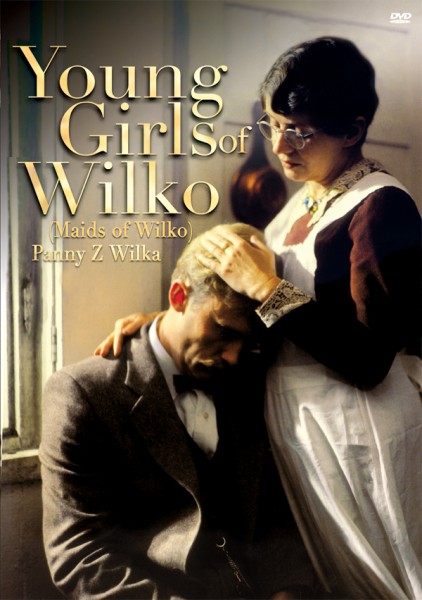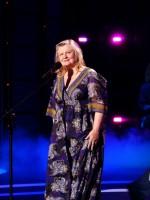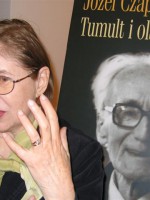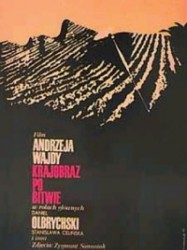Les demoiselles de Wilko est un film polonais de genre Drame réalisé par Andrzej Wajda avec Daniel Olbrychski
Les demoiselles de Wilko (1979)

Si vous aimez ce film, faites-le savoir !
- Infos
- Casting
- Infos techniques
- Photos
- Vidéos
- Passages TV
- Citations
- Personnages
- Musique
- Récompenses
Les Demoiselles de Wilko (Panny z Wilka) est un film polonais réalisé par Andrzej Wajda, d’après la nouvelle éponyme de Jarosław Iwaszkiewicz, sorti en 1979.
Synopsis
En 1929, un homme retrouve la maison où, quinze ans plus tôt il passa un été avec cinq jeunes filles.Acteurs

Daniel Olbrychski
(Wiktor Ruben)

Anna Seniuk
(Julcia)

Maja Komorowska
(Jola)

Stanisława Celińska
(Zosia)

Krystyna Zachwatowicz-Wajda
(Kazia)
Commentaires
Postez un commentaire :
Suggestions de films similaires à Les demoiselles de Wilko
Il y a 58 films ayant les mêmes acteurs, 38 films avec le même réalisateur, 68156 ayant les mêmes genres cinématographiques (dont 13412 ayant exactement les mêmes 2 genres que Les demoiselles de Wilko), pour avoir au final 70 suggestions de films similaires.Si vous avez aimé Les demoiselles de Wilko, vous aimerez sûrement les films similaires suivants :

Paysage après la Bataille (1970)
, 1h41Réalisé par Andrzej Wajda
Origine Pologne
Genres Drame, Guerre, Historique, Romance
Acteurs Daniel Olbrychski, Aleksander Bardini, Stanisława Celińska, Tadeusz Janczar, Zygmunt Malanowicz, Mieczysław Stoor
Note69%





The Landscape After the Battle film tells a story of two young concentration camp survivors. A young Polish poet (Tadeusz) is asked by a pretty Jewish girl (Nina) to go with her to the West. His camp experience, however, prevents him from realizing the depth of her love for him, and he is reluctant to commit. The woman is accidentally shot dead by an American soldier, causing the poet to cry for the first time in years. The shock of her death brings back the world of feelings suppressed by his Nazi captors, and allows for his original creativity to reemerge.
 , 2h27
, 2h27Réalisé par Andrzej Wajda
Genres Drame, Guerre, Historique, Romance
Thèmes Histoire de France, Guerres napoléoniennes
Acteurs Bogusław Linda, Alicja Bachleda-Curuś, Jerzy Bińczycki, Daniel Olbrychski, Grażyna Szapołowska, Andrzej Seweryn
Note60%





La scène se déroule en Lituanie en 1812, alors que la Pologne est rayée de la carte. Deux familles s'affrontent, l'une alliée aux Russes, l'autre indépendantiste. En juin 1812, Napoléon marche sur Moscou et franchit le Niémen.

Le Bois de bouleaux (1970)
, 1h39Réalisé par Andrzej Wajda
Origine Pologne
Genres Drame, Musical, Romance
Acteurs Olgierd Łukaszewicz, Daniel Olbrychski, Marek Perepeczko, Mieczysław Stoor, Andrzej Kotkowski
Note68%





Dans un petit village de Pologne, Borslaw vit seul avec sa fillette depuis la mort de sa femme dans une maison au fond des bois, désespéré. Stanislaw, frère de Borslaw, dandy gai et sympathique arrive au village, où il vient finir ses jours, étant a atteint d'une phtisie au stade terminal. Ce dernier, se sachant condamné, a décidé de profiter de la vie jusqu’au bout.

Panna Nikt (1996)
, 1h38Réalisé par Andrzej Wajda
Origine Pologne
Genres Drame
Acteurs Anna Mucha, Stanisława Celińska, Leszek Teleszyński, Małgorzata Pieczyńska, Anna Romantowska
Note58%





 , 2h59
, 2h59Réalisé par Andrzej Wajda
Origine Pologne
Genres Drame, Historique
Acteurs Daniel Olbrychski, Wojciech Pszoniak, Andrzej Seweryn, Anna Nehrebecka, Kalina Jędrusik, Franciszek Pieczka
Note77%





À la fin du XIX siècle, Łódź est devenue le centre textile le plus important d'Europe. La société polonaise en est profondément bouleversée.

Cendres (1965)
, 3h54Réalisé par Andrzej Wajda, Andrzej Żuławski
Origine Pologne
Genres Drame, Guerre, Historique
Acteurs Daniel Olbrychski, Beata Tyszkiewicz, Pola Raksa, Władysław Hańcza, Jan Koecher, Zbigniew Sawan
Note70%





Le film se déroule pendant les guerres napoléoniennes.

Les Noces (1973)
, 1h42Réalisé par Andrzej Wajda
Origine Pologne
Genres Drame
Thèmes Théâtre, Adaptation d'une pièce de théâtre
Acteurs Daniel Olbrychski, Ewa Ziętek, Andrzej Łapicki, Wojciech Pszoniak, Franciszek Pieczka, Marek Perepeczko
Note69%





A poet marries a peasant girl. Their wedding reception follows. The celebration of the new marriage moves on from the church to the villager's house. In the rooms adjoining that of the wedding party, guests continually burst into arguments, make love, or simply rest from their merriment, dancing and feasting. Interspersed with the real guests are the well-known figures of Polish history and culture, who represent the guilty consciences of the characters. The two groups gradually begin a series of dialogues. The Poet (played by Andrzej Łapicki) is visited successively by the Black Knight, a symbol of the nation's past military glory; the Journalist (played by Wojciech Pszoniak), then by the court jester and conservative political sage Stańczyk; and the Ghost of Wernyhora (Marek Walczewski), a paradigm of leadership for Poland. Wernyhora presents the Host with a golden horn symbolizing the national mission, and calls the Polish people to a revolt. One of the farm hands is dispatched to sound the horn at each corner of Poland, but he loses the horn soon after.

Tout est à vendre (1969)
, 1h34Réalisé par Andrzej Wajda
Origine Pologne
Genres Drame
Acteurs Beata Tyszkiewicz, Daniel Olbrychski, Elżbieta Czyżewska, Andrzej Łapicki, Bogumił Kobiela, Elżbieta Kępińska
Note67%





Un homme court sur le quai d'une gare pour essayer d'attraper un train en marche, manque le marchepied, trébuche et meurt écrasé sous les roues du wagon. C'est ainsi que commence la première séquence d'un film dont le tournage vient de débuter sous la direction du metteur en scène ‘Andrzej'. Mais l'acteur qui devait jouer cette scène est absent et a dû être doublé.

Chasse aux mouches (1969)
, 1h44Réalisé par Andrzej Wajda
Origine Pologne
Genres Comédie, Romance
Acteurs Zygmunt Malanowicz, Daniel Olbrychski, Małgorzata Braunek, Jacek Fedorowicz, Stefan Friedmann, Jolanta Lothe
Note62%





Wlodek est un homme timide qui a peur de sa mère ainsi que de sa femme. Cependant, après avoir rencontré Irena, sa vie prend un nouveau tournant.

L'Homme de marbre (1977)
, 2h40Réalisé par Andrzej Wajda
Origine Pologne
Genres Drame, Historique
Thèmes Politique
Acteurs Krystyna Janda, Jerzy Radziwiłowicz, Tadeusz Łomnicki, Krystyna Zachwatowicz-Wajda, Kazimierz Kaczor, Ewa Ziętek
Note76%





Agnieszka, une jeune réalisatrice de la télévision, enquête sur un maçon stakhanoviste des années cinquante, Mateusz Birkut, tombé depuis en disgrâce et veut connaître la vérité sur cet ancien héros.
 Connexion
Connexion